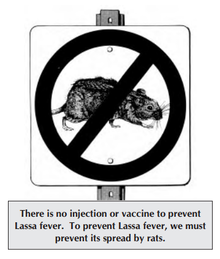OUT BREAK OF LASSA FEVER IN BORNO STATE NIGERIA
Lassa virus is zoonotic (transmitted from animals), in that it spreads to humans from rodents, specifically multimammate mice (Mastomys natalensis).This is probably the most common mouse in equatorial Africa, ubiquitous in human households and eaten as a delicacy in some areas.[8] In these rodents, infection is in a persistent asymptomatic state. The virus is shed in their excreta (urine and feces), which can be aerosolized. In fatal cases, Lassa fever is characterized by impaired or delayed cellular immunity leading to fulminant viremia.
Infection in humans typically occurs by exposure to animal excrement through the respiratory or gastrointestinal tracts. Inhalation of tiny particles of infectious material (aerosol) is believed to be the most significant means of exposure. It is possible to acquire the infection through broken skin or mucous membranes that are directly exposed to infectious material. Transmission from person to person has also been established, presenting a disease risk for healthcare workers. Frequency of transmission by sexual contact has not been established.Preventio
Control of the Mastomys rodent population is impractical, so measures are limited to keeping rodents out of homes and food supplies, as well as maintaining effective personal hygiene. Gloves, masks, laboratory coats, and goggles are advised while in contact with an infected person. These issues in many countries are monitored by a department of public health. In less developed countries, these types of organizations may not have the necessary means to effectively control outbreaks.
Researchers at the USAMRIID facility, where military biologists study infectious diseases, have a promising vaccine candidate.[12] They have developed a replication-competent vaccine against Lassa virus based on recombinant vesicularstomatitis virus vectors expressing the Lassa virus glycoprotein. After a single intramuscular injection, test primates have survived lethal challenge, while showing no clinical symptoms.

No comments:
Post a Comment